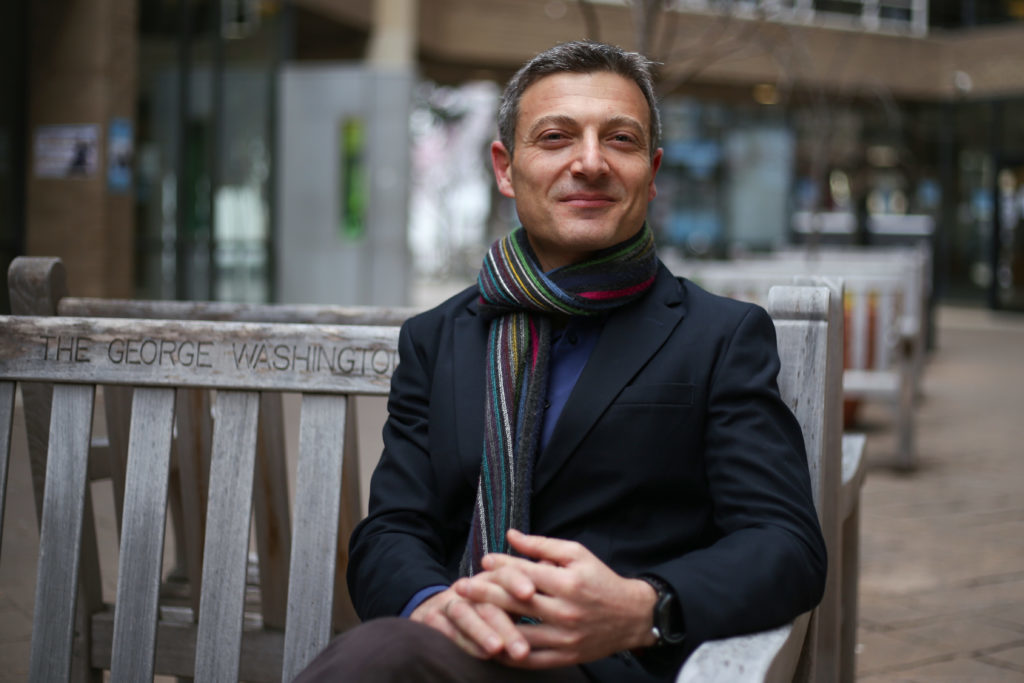Updated: March 30, 2018 at 4:30 p.m.
A new course and conference this spring will mark the 70th anniversary of Israel’s independence and study how it sparked the ongoing conflict with Palestinians.
The spring course, 1948 Triumph and Tragedy, and this year’s annual Institute of Middle East Studies conference will delve into the historical and contemporary issues associated with the 1948 Arab-Israeli War and the tension that has persisted between the two sides in the decades since. Faculty said these initiatives commemorate the historically significant events seven decades ago and enable interested students to learn more about Israel and the Middle East.
Arie Dubnov, an associate history professor who was born and raised in Israel, is teaching the new course on the anniversary of the war. He said the course focuses on war history and “how each side has different scars” and different memories of events.
“We’re moving to a different angle of commemoration and memory.”
“I’m trying to push my students to think about the connection between history and mythology – why specific battles became more famous than the others,” he said.
Dubnov added that students in the course will examine the differences between the Palestinian and Israeli perspectives on the founding of Israel, and how those competing viewpoints might influence opposing grassroots movements on both sides of the conflict that continue to stall peace negotiations.
The 1948 war began when a group of Arab countries invaded Israel in 1948 after the country had declared independence. The war expanded Israeli territory and generated a mass-immigration of Jewish people expelled from Arab states into Israel. The war also triggered the “Nakba,” which is Arabic for “disaster,” when more than 700,000 Palestinian Arabs were kicked out or fled from their homes in Israeli-controlled territory.
Like the course, this year’s conference will also serve as a forum to discuss how the two sides of the 1948 war still shade current affairs, Dubnov, who is also one of the conference organizers, said. This year’s theme is Nakba, Past and Present and will focus on Israel’s independence and the post-war Palestinian refugee crisis, according to the website.
“We’re moving to a different angle of commemoration and memory,” Dubnov said.
The conference, which will be held in the Elliott School of International Affairs April 13, will start with a keynote address by University of California, Santa Barbara associate history professor Sherene Seikaly, followed by three panel discussions leading into the afternoon, according to the website.
Panels will feature interdisciplinary scholars and experts in both Palestinian and Hebrew literature from a variety of institutions, including Yale University and Aalborg University in Denmark.
Dubrov said having Hebrew and Palestinian experts speak together about their views on 1948 may lead to an engaging, fierce and potentially uncomfortable debate.
“I am sure the conference will lead some people to raise an eyebrow,” he said. “But it’s important to me to remind myself that a university is the place to do it. If we can’t tackle issues here, we can’t do it anywhere.”
The Israeli-Palestinian conflict surfaced on campus last spring, when the Student Association narrowly rejected a resolution to call on the University to divest from corporations that profit off of the Palestinian occupation. The resolution sparked a wave of opposition on campus led by pro-Israel groups.
“Scholars have a role to play in discovering, understanding and analyzing what occurred.”
Nathan Brown, the director of the Institute for Middle East Studies and another organizer for next month’s conference, said the event is designed to focus on how the events of 1948 are remembered and discuss “new and fresh” research in the area.
“There has been a lot of research, much of it very recent, on the events of 1948,” he said. “Scholars have a role to play in discovering, understanding and analyzing what occurred, how they were understood and any continuing relevance they might have.”
Daniel Schwartz, the director of the Judaic studies program, said he opposes the framing of the event focusing only on Nakba, rather than exploring both the Israeli and Palestinian experiences in the conflict.
“The people from the Institute of Middle East Studies who wanted to put this conference together made their own decisions and decided to focus exclusively on the Nakba and we’re not going to sponsor a conference that would be so one-sided in its focus,” he said.



